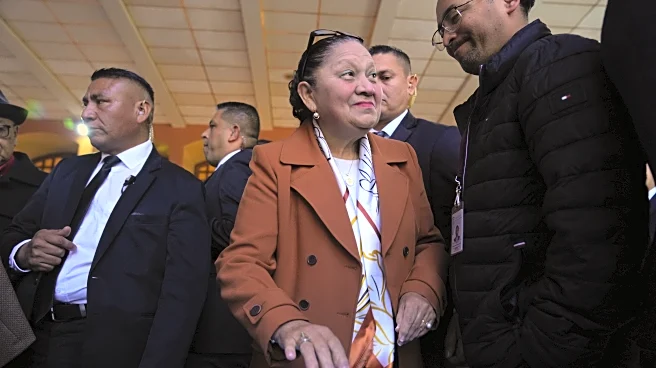What's Happening?
The Association of American Publishers (AAP) has endorsed a proposed $1.5 billion settlement in the Bartz v. Anthropic case, a class-action lawsuit addressing copyright infringement by the AI company Anthropic. The lawsuit claims Anthropic used copyrighted books from illegal shadow libraries to train its AI models without permission. The settlement, considered historic, involves compensation for authors and publishers at a rate of $3,000 per book. The settlement fund will be paid in installments and aims to resolve claims of mass piracy of books. The case highlights the ongoing battle between AI companies and copyright holders.
Why It's Important?
The endorsement by AAP signifies a major step in addressing copyright infringement in the AI industry. It emphasizes the need for AI companies to respect intellectual property rights and pay for the use of copyrighted materials. The settlement could pave the way for more licensing agreements and legal actions against AI companies that use pirated content. It also highlights the financial disparity between wealthy tech companies and authors, who often earn modest incomes. The case serves as a warning to AI companies about the consequences of using pirated content for training purposes.
What's Next?
The settlement awaits final approval from the court, which will determine its implementation. If approved, Anthropic will begin funding the settlement in scheduled installments. The case may lead to increased scrutiny of AI companies' data acquisition practices and push for more transparent licensing agreements. It could also inspire similar lawsuits from authors and publishers seeking compensation for unauthorized use of their works. The industry may see a shift towards more ethical and legal approaches to AI training.
Beyond the Headlines
The case raises broader questions about the balance between innovation and intellectual property rights. It challenges the notion of 'fair use' in the context of AI training and highlights the ethical responsibilities of tech companies. The settlement could lead to long-term changes in how AI companies approach data acquisition and copyright compliance. It reflects societal concerns about the impact of AI on creative industries and the need for regulations that protect both innovation and intellectual property.










![Cortisol vs. Melatonin: The Biological War Happening Inside Every Night-Shift Worker]](https://glance-mob.glance-cdn.com/public/cardpress/binge-magazine-card-generation/spaces/US/en/discover-daily/images/ppid_7byehtbd-image-177082393426031154.webp)